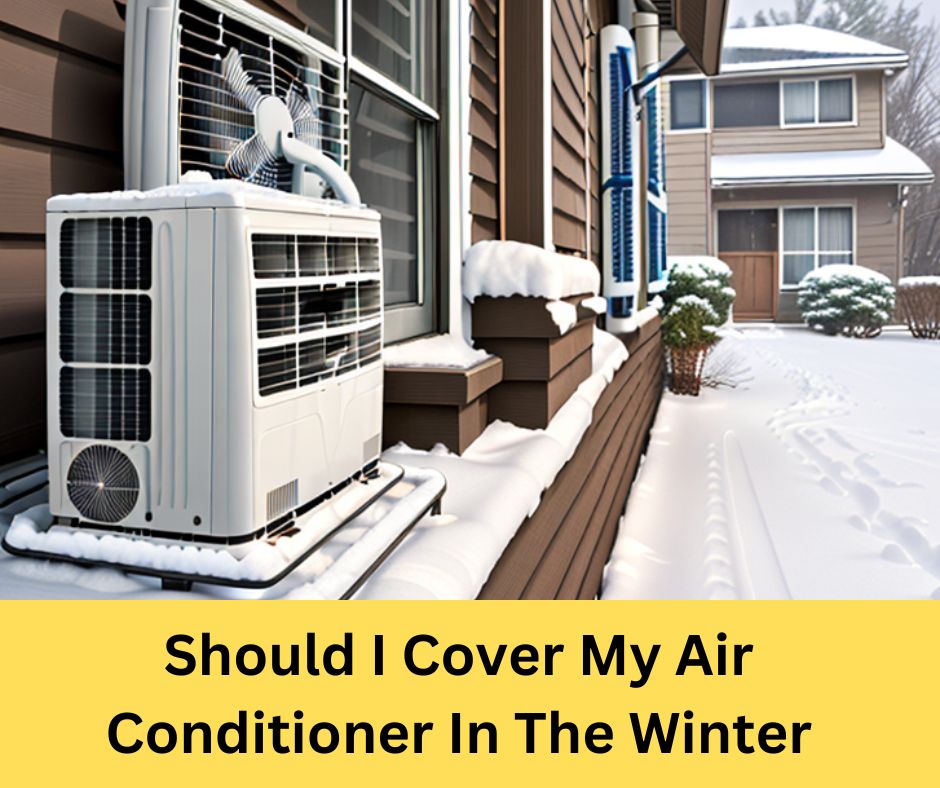Welcome to our comprehensive guide on the age-old question: Should I cover my air conditioner in the winter? We understand that your HVAC system is a significant investment, and you’re keen on doing everything possible to ensure its longevity. In this article, we will delve into the nuances of this decision, providing you with the information you need to make an informed choice for your home. So, whether you’re gearing up for the chilly months or just curious about the best way to protect your air conditioner, stay connected with us for all the details you need to know.
Should I Cover My Air Conditioner In The Winter

Should I Cover My Air Conditioner in the Winter?
As winter approaches, the question of whether to cover your air conditioner becomes a common concern for many homeowners. Your air conditioning unit is a valuable investment, and naturally, you want to protect it. However, the answer isn’t a straightforward “yes” or “no.” In this article, we’ll carefully examine the pros and cons of covering your air conditioner during the winter season, allowing you to make an educated decision for your specific circumstances.
The Pros of Covering Your Air Conditioner in the Winter:
- Protection from Harsh Weather: Winter can bring with it heavy snow, ice, and freezing temperatures. Covering your air conditioner can shield it from the potential damage caused by these elements. Ice buildup on your AC unit, for instance, can lead to costly repairs.
- Prevention of Debris Accumulation: A securely covered air conditioner can prevent leaves, twigs, and other debris from accumulating inside the unit. This debris can obstruct airflow and hinder the unit’s efficiency when you start using it again in the warmer months.
- Extended Lifespan: Providing protection for your air conditioner during the off-season can contribute to its overall longevity. Reduced exposure to the elements may lead to fewer maintenance issues over time.
- Energy Efficiency: By covering your AC unit, you can potentially save energy during the winter. Covered units are less likely to leak warm air from your home, helping to keep your heating costs down.
The Cons of Covering Your Air Conditioner in the Winter:
- Moisture Trapping: One of the most significant concerns with covering your air conditioner is the potential for trapping moisture inside. Moisture buildup can lead to corrosion and mold growth, causing more harm than good.
- Pest Attraction: A covered unit can provide a cozy hideout for pests seeking shelter from the cold. This can result in unwanted guests, like rodents, making a home in your AC unit.
- Improper Installation: If not done correctly, covering your air conditioner can do more harm than good. Incorrectly placed covers can compress against the unit, potentially damaging sensitive components.
- Ventilation Issues: Covering your AC unit can restrict proper ventilation, which is essential for preventing condensation and maintaining a healthy environment inside the unit.
Tips to Protect Your Air Conditioner in the Winter
As winter rolls in, it’s crucial to ensure your air conditioner stays in top-notch condition for when you need it again. Taking the right steps to protect your AC unit during the colder months can save you money on repairs and extend its lifespan. Here are some practical tips to keep your air conditioner safe and sound until the warmth of spring returns.
- Clean and Clear: Before you do anything else, give your air conditioner a good cleaning. Remove any leaves, debris, or dirt that may have accumulated around or inside the unit during the fall. A clean AC unit is better equipped to handle winter conditions.
- Turn Off the Power: Locate the circuit breaker or disconnect switch for your air conditioner and turn off the power. This step is crucial for safety when performing maintenance tasks.
- Cover It Up (Carefully): If you decide to cover your air conditioner, choose a breathable cover designed for this purpose. Avoid using plastic or non-breathable materials that can trap moisture and lead to corrosion. Ensure the cover is securely fastened to prevent it from blowing away in strong winds.
- Elevate Your Unit: If possible, place a piece of plywood or a special condenser pad beneath the unit. This helps to elevate it slightly and prevents it from sitting directly on the ground, which can lead to moisture problems.
- Insulate Pipes: If you have exposed refrigerant lines or pipes, consider insulating them to protect against freezing. You can find foam pipe insulation at most hardware stores. Wrapping them in this insulation will help maintain their integrity.
- Regular Check-Ups: Schedule a professional maintenance check-up before winter sets in. An HVAC technician can ensure your unit is in good shape and make any necessary repairs or adjustments.
- Mind the Thermostat: Adjust your thermostat settings to reduce strain on your AC unit during the colder months. Setting it to a temperature that is energy-efficient but prevents freezing inside the unit is key.
- Clear Snow and Ice: After snowfall, gently remove snow and ice from the top of your covered air conditioner to prevent excessive weight and damage.
- Don’t Cover Heat Pumps: If you have a heat pump system, avoid covering it during the winter. Heat pumps work year-round and should not be obstructed.
- Keep an Eye Out: Periodically check on your covered air conditioner throughout the winter. Make sure the cover remains secure and that there are no signs of pests or moisture accumulation.
FAQ:
Question : Why Should I Consider Covering My Air Conditioner in the Winter?
Answer: Covering your air conditioner during the winter can provide protection from harsh weather conditions, prevent debris accumulation, extend its lifespan, and even save on energy costs by reducing heat loss from your home.
Question : What Type of Cover Should I Use for My Air Conditioner?
Answer: Opt for a breathable cover specifically designed for air conditioning units. Avoid plastic or non-breathable materials that can trap moisture. Ensure the cover fits securely to prevent it from blowing away in strong winds.
Question : Are There Any Downsides to Covering My Air Conditioner in the Winter?
Answer: Yes, there can be downsides. Covering an air conditioner improperly can trap moisture, attract pests, compress sensitive components, and restrict ventilation, potentially causing more harm than good.
Question : Should I Turn Off the Power to My Air Conditioner in the Winter?
Answer: Yes, it’s advisable to turn off the power to your AC unit during the winter. Locate the circuit breaker or disconnect switch and switch it off. This is essential for safety when performing maintenance tasks.
Question : Can I Leave My Heat Pump System Uncovered in the Winter?
Answer: Yes, you should leave your heat pump system uncovered in the winter. Heat pumps work year-round, providing both heating and cooling, so they should not be obstructed by covers. Just ensure they are free from debris and well-maintained for optimal performance.
Conclusion:
In the end, the decision of whether to cover your air conditioner in the winter revolves around careful consideration of the pros and cons. Protecting your AC unit from harsh weather, debris, and potential damage can undoubtedly extend its lifespan and save on energy costs. However, it’s crucial to do it right – choose a breathable cover, elevate the unit, and remain vigilant for moisture and pests. Ultimately, whether or not you cover your air conditioner, regular maintenance and upkeep are key to ensuring it remains in peak condition, ready to keep you cool when the seasons change once more. So, to answer the question, “Should I cover my air conditioner in the winter?” – it’s a choice that depends on your specific circumstances and a little extra care can go a long way in preserving your investment.



